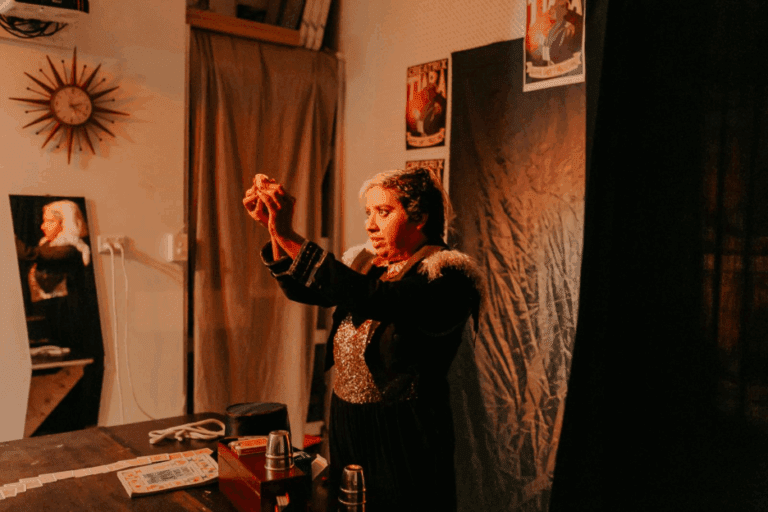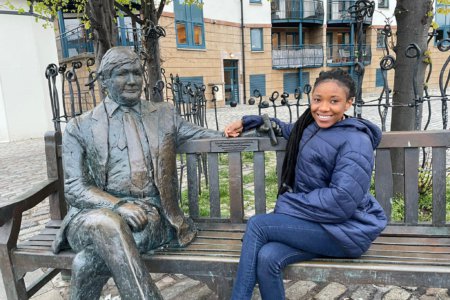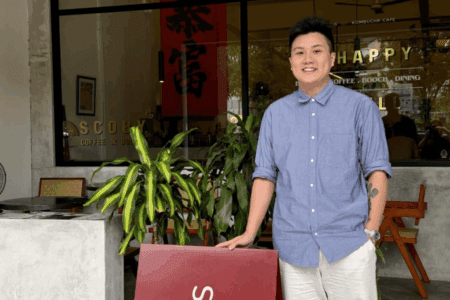
Six years after Tiara Shafiq — now, better known by their stage name Creatrix Tiara — took a dive into the dance of burlesque as a brown person in a white-centric scene, they started to receive apologies from people they’d considered enemies back in the day.
“I straight up just cried,” they say, because while time may heal old wounds, there’s no losing the scars etched into your mind. Especially, when due to discrimination.
Much has happened since Creatrix’s burlesque days. “Shenanigans” is what they’ve termed their pursuits in the Australian performing arts scene, despite its association with mischief, trouble, and deception. Though perhaps, mischief and Creatrix do complement each other well, since anything that’s ever built up into a serious project, often started as a joke.
For example: the Queer Lady Magician, which in Creatrix’s words is a queer, feminist, anti-racist, and decolonial take on stage magic. “It literally started as, ‘Haha, what if there was a queer lady magician show?’ Because I loved stage magic as a child, but a lot of stage magicians were straight cis white dudes,” they say.
Creatrix refers to it as “jokefesting,” because eventually, the idea would not settle itself simply as another passing thought. They made their debut in the 2018 Melbourne Fringe Festival and took an approach to stage magic never seen.
Their signature cups and balls routine is actually a guide to using menstrual cups, and the “Bullet Catch” performance alludes to cultural appropriation. Perhaps, mischief and Creatrix don’t just complement each other for their spontaneity in stage pursuits, but because Creatrix dared to do the one thing many fear: speak out.
But God forbid someone defends their rights, right?

The cycles of discrimination
Creatrix decided to take burlesque classes in Australia after landing their first ever theatre role post-university, as the lesbian dominatrix in The Vagina Monologues. It was another shenanigan, a spontaneous endeavour before returning home from their studies abroad, but what they did not expect was to fall in love with the form entirely.
One pursuit snowballed into another, and Creatrix would eventually take the stage as a burlesque dancer and a Dandy Minion in drag artist Taylor Mac’s 24 Decade History of Popular Music at the Melbourne Festival. The theatrical show was celebrated by the prestigious Helpmann Awards, which recognises some of Australia’s most talented performers.
“That role is very unique to Taylor Mac; we’re basically the bridge between the audience and the stage, and we’re there for almost all 24 hours of it,” they say.
But before there was Creatrix Tiara — Queer Lady Magician, former burlesque dancer, and multimedia artist — there was Tiara Shafiq, a kid from Johor Bahru, Malaysia, who loved Savage Garden, and watched lots of MTV and Channel [V]. They were driven by a love for writing, television, and radio, but burdened by the state of their identity.
“My family is Bangladeshi, so my entire school life was just a lot of anti-Bangladeshi sentiments. I didn’t feel like I had any space to consider any other part of myself, beyond my race,” they say. “I look back at the stuff I wrote when I was 16 and being so tortured, and I’m like, girl, you’re just gay.”
Identity is a complicated thing to grapple with, and it’s about a thousand times more complicated when you’re in a society that’s not kind to you. Malaysia has progressed tremendously, as a cultural melting pot where people of different races can co-exist, but it’s not perfect. Queerness remains a crime. On Quora, a Bangladeshi student in Malaysia highlighted the negative assumptions they were subject to.
“I was a child, and yet from [grade] five onwards, people were expecting me to answer for Bangladeshi people, which is especially unfair to ask a child,” Creatrix says. “I didn’t even know how to communicate this to my parents…and I didn’t really have anyone advocating for me, at the time.”
 The 2018 Melbourne Fringe Festival production of Queer Lady Magician.
The 2018 Melbourne Fringe Festival production of Queer Lady Magician.
The brighter side, the darker side
After a short stint at a local university, Creatrix found themselves burnt out. They took a gap year, and it became the learning experience university wasn’t. They travelled across US, Japan, and Europe, started a blog about youth empowerment and alternatives to education, and even worked with Channel [V].
Then, their parents had pleaded with them to get a degree, which Creatrix agreed to on one condition: They would choose where to study. That would end up being the Queensland University of Technology in Brisbane, Australia, which they mainly chose because it’s the home of Savage Garden.
“Being in Australia gave me the space to explore,” they said. “Be in a community, be at events, or go to queer spaces, and have queer friends. I got to be more than just one aspect of myself. After I finished uni, that was when I especially got into queer community organising. There’s an organisation in Brisbane that provides social support and health services to LGBT folk, and I volunteered with them.”
At least, in Australia, Creatrix didn’t have to fear being thrown in jail.
Jumping ship doesn’t mean certain issues no longer follow you, however. While burlesque gave Creatrix a platform to channel their identity, they were also met with rampant racism — a deep-seated industry problem. Creatrix was certainly not the first to speak out about it, but they were definitely one of the loudest.
“I was more upfront about it, and I lost a career because of that,” they said. “There was a similar sense of isolation [to when I was a child], but I’m also an adult by then, right? I had more ability to speak up. I had more ability to find people that would rally with me.”
Fast forward to just a few years ago: a burlesque competition in Australia had featured blackface and yellowface. Audiences were shocked, but all Creatrix could do was leave a snarky comment: This has been a long-running problem. That’s when the messages started to trickle in. That’s when people realised Creatrix was right.
“All of these people showed up from the woodwork, going, ‘You warned us about this years ago, and we didn’t listen to you, and we’re very sorry.’ It took you six years, but okay. It was fascinating to see all of that — now there’s a lot more awareness.”
Creatrix says that if they ever encountered someone who was facing the same kind of discrimination they did, they wouldn’t just offer up advice. They would simply listen. Though, with their work as the Queer Lady Magician, and the bravery to make noise in the face of injustice, Creatrix has done far more than that.
“A lot of times, they just need someone to hear them out, and validate, and recognise them,” they say. “Saying, ‘Oh, it’ll be okay,’ or ‘This will be fine.’ That’s not helpful because that’s not really something I can promise anyone.”










